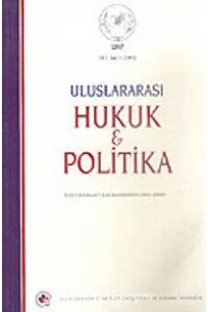Troubled waters in the mare nostrum: ınterception and push-backs of migrants in the mediterranean and the european convention on human rights
Akdeniz’in tehlikeli sularında: göçmenlerin durdurulması, geri itilmesi ve Avrupa İnsan Hakları Sözleşmesi
___
- Battjes H., “The Soering Threshold: Why Only Fundamental Values Prohibit Refoule- ment in ECHR Case Law”, European Journal of Migration and Law, Vol. 11, 2009, pp. 205-219.
- Del Grande G., “Guantanamo Libya. The New Italian Border Police”, in Dossier – Bor- der Politics: Migration in the Mediterranean, July 2009, http://www.migration- boell.de/web/migration/46_2173.asp.
- Fischer-Lescano A., Löhr T., Tohidipur T., “Border Controls at Sea: Requirements un- der International Human Rights and Refugee Law”, International Journal of Refu- gee Law, Vol. 21, 2009, pp. 256-296.
- Goodwin-Gill G.S., “The Right to Seek Asylum: Interception at Sea and the Principle of Non-refoulement”, International Journal of Refugee Law, Vol. 23, 2011, pp. 443- 457.
- Guilfoyle D., Shipping Interdiction and the Law of the Sea (New York: Cambridge University Press, 2011).
- Human Rights Watch, Pushed Back, Pushed Around: Italy’s Forced Return of Boat Migrants and Asylum Seekers, Libya’s Mistreatment of Migrants and Asylum Seekers, 21 September 2009, http://www.hrw.org/en/reports/2009/09/21/pushed-back- pushed-around-0.
- Janik C. and Kleinlein T., “When Soering Went to Iraq...: Problems of Jurisdiction, Ex- traterritorial Effect and Norm Conflicts in Light of the European Court of Human Rights Al Saadoon Case”, Goettingen Journal of International Law, Vol. 1, 2009, p. 459, http://gojil.uni-goettingen.de/ojs/index.php/gojil/article/view/86/pdf_jk. Klepp S., “A Contested Asylum System: The European Union between Refugee Protec- tion and Border Control in the Mediterranean Sea”, European Journal of Migration and Law, Vol. 12, 2010, pp. 1-21.
- Lutterbeck D., “From Blame Game to Cooperation; Coping with the “Migration Crisis” in the Central Mediterranean”, in Dossier – Border Politics: Migration in the Medi- terranean, July 2009, http://www.migration-boell.de/web/migration/46_2173.asp.
- Maccanico Y., “Italy: The Internal and External Fronts: Security Package and Returns”, Statewatch Bulletin, Vol. 19, No. 3, July-Sept 2009, http://www.statewatch.org/ analyses/no-100-italy-internal-external-fronts.pdf. Milanovic M., Extraterritorial Application of Human Rights Treaties: Law, Principles, and Policy (New York: Oxford University Press, 2011).
- Moreno-Lax V., “Hirsi Jamaa and Others v. Italy or the Strasbourg Court Versus Ex- traterritorial Migration Control?”, Human Rights Law Review, Vol. 12, 2012, pp. 574-598.
- Mowbray A., The Development of Positive Obligations Under the European Convention on Human Rights by the European Court of Human Rights (Oxford: Hart Publish- ing, 2004).
- Mungianu R., “Frontex: Towards a Common Policy on External Border Control”, Euro- pean Journal of Migration and Law, Vol. 15, 2013, pp. 359-385.
- Papanicolopulu I., “Hirsi Jamaa v. Italy”, Case Comment, American Journal of Interna- tional Law, Vol. 107, 2013, pp. 417-423.
- Papastavridis, E., “Fortress Europe and FRONTEX: Within or without International Law”, Nordic Journal of International Law, Vol. 79, 2010, pp. 75-111.
- PRO ASYL, Pushed Back: Systematic human rights violations against refugees in the Aegean Sea and at the Greek-Turkish land border, November 2013, http://oppen- heimer.mcgill.ca/IMG/pdf/Pro_Asyl_-_Pushed_Back_Report.pdf.
- Ronzitti N., “Il trattato Italia-Libia di amicizia, partenariato e cooperazione”, Contribu- ti di Istituti di ricerca specializzati, n. 108, gennaio 2009, http://www.iai.it/pdf/Oss_Transatlantico/108.pdf.
- Treves T., “Human Rights and the Law of the Sea”, Berkeley Journal of International Law, Vol. 28, 2010, pp. 1-14.
- Trevisanut S., “Maritime Border Control and the Protection of Asylum-Seekers in the European Union”, Touro International Law Review, Vol. 12, 2009, pp. 157-161.
- ISSN: 1305-5208
- Yayın Aralığı: 5
- Başlangıç: 2018
- Yayıncı: Uluslararası Stratejik Araştırmalar Kurumu
Social policy and local administrations in the era of globalization
MEHTAP YEŞİLORMAN, FİRDEVS KOÇ BAYKARA
Successful peacekeeping by regional organizations: Necessarily hybrid
Bir örgütlenme çerçevesi olarak ‘ASEAN Yolu’nun başarısı
ÇAĞRI EMİN DEMİRBAŞ, GÜLŞEN AYDIN
Dersaadet’te bir sosyalist: Parvus Efendi (Cenk Beyaz, Ötüken Neşriyat, İstanbul, 2013, 240 Sayfa.)
Çağdaş sanat ve kültüralizm (Ali Artun, İletişim Yayınları, İstanbul, 2013, 210 Sayfa.)
